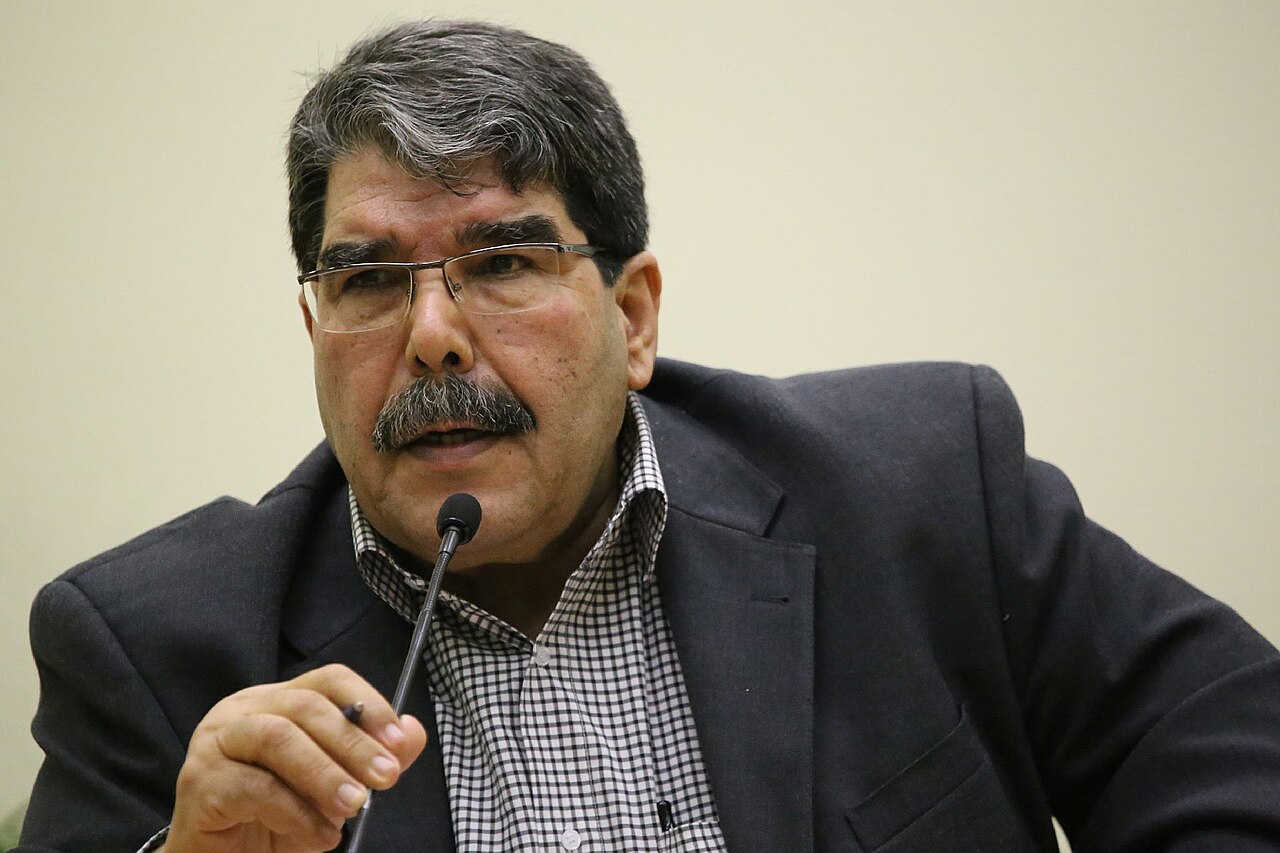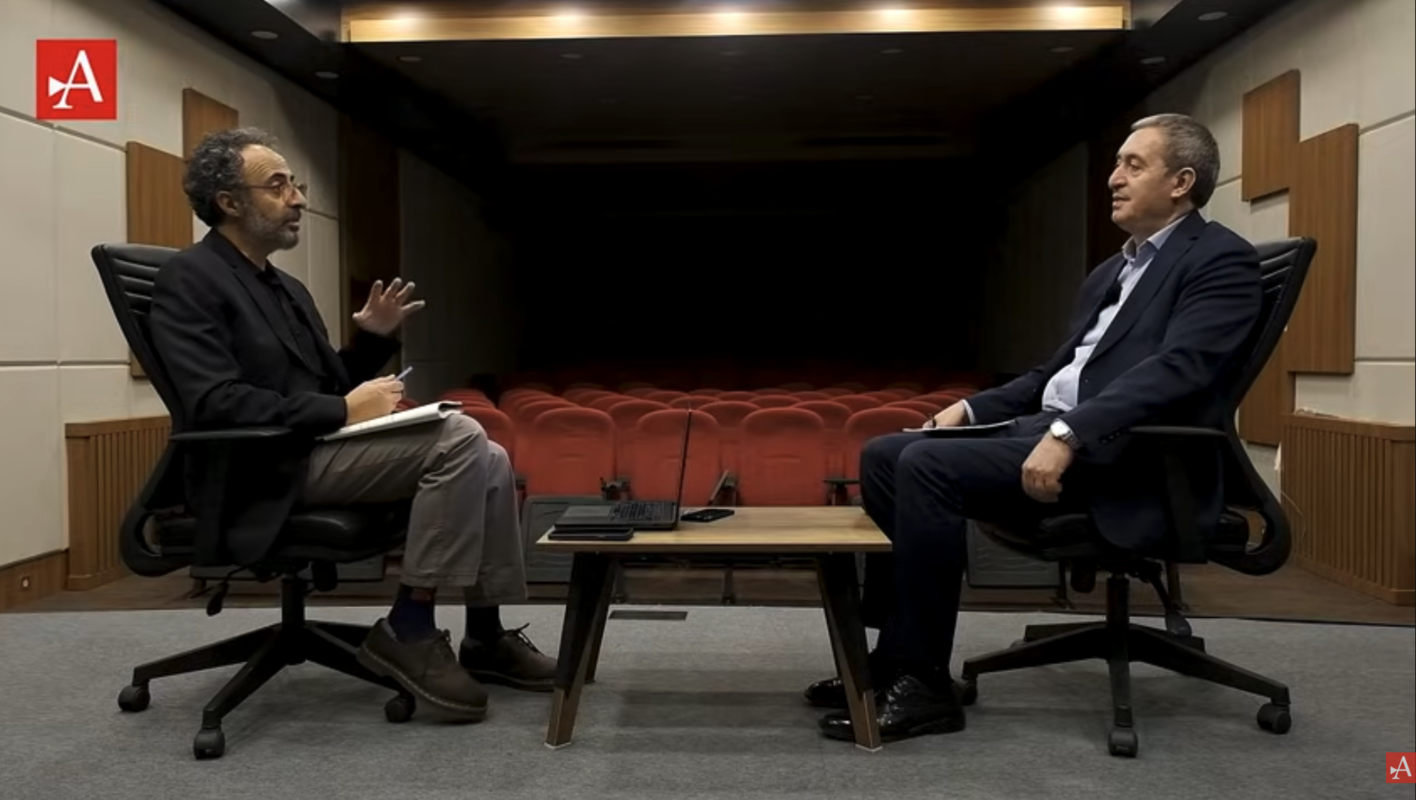The Amargi Exclusive: Syrian-Kurdish Leader to Damascus and Washington,“Integration, Not Assimilation”

Zwischen Selbstverwaltung, Demokratie und Angriffen des IS.
Mit Ulla Jelpke (DIE LINKE) und Salih Muslim (PYD); Moderation: Murat Çakir (Rosa-Luxemburg-Stiftung)
Berlin, 18.11.2014
http://www.rosalux.de/documentation/52165
Kurdish leader Salih Muslim at Rosa Luxemburg Foundation in Berlin | Photo Credits: Rosa Luxemburg Foundation / Wikimedia Commons
Until the fall of Bashar al-Assad last December, Syrian interim president Ahmed al-Sharaa was one of the most wanted men in the world, carrying a $10 million U.S. bounty on his head. Yet, last week, he became the first Syrian leader ever to enter the Oval Office.
Now, the Syrian Kurds, Washington’s key partners in the fight against ISIS in Syria, are urging both Damascus and Washington to ensure that this new rapprochement does not come at their expense.
The U.S. Treasury removed Ahmed al-Sharaa from its terrorist list just days before his visit. President Trump – who did not greet him at the White House door as is normal protocol – praised him warmly once inside: “He’s had a rough past, but if you didn’t, you wouldn’t have a chance.” Trump also added, “He comes from a very tough place, and he’s a tough guy. I like him and I get along with him.”
Al-Sharaa’s rapid metamorphosis from insurgent to statesman embodies Trump’s doctrine of “no permanent enemies.” In Washington’s view, he represents something else: a strategic opportunity. His presidency offers a chance to push Iran out of Syria, disrupt the Tehran–Hezbollah corridor, diminish Russia’s influence, and pull Damascus closer to the Western bloc.
But below the surface of this geopolitical realignment lies a volatile question: What does this mean for the Kurds and the Kurdish-led autonomous administration that governs Northeast Syria, or Rojava?
To understand this, the Amargi spoke with Salih Muslim, member of the Democratic Union Party (PYD) Presidential Council and one of the central political figures involved in negotiating the future of Syria’s Kurdish-led regions.
A Fragile Roadmap: The March 10 Agreement
“This is not the first time the West has embraced someone with such a past.”
According to al-Sharaa, the March 10 agreement between the Syrian interim government and the Syrian Democratic Forces (SDF) is a roadmap for national unity, joint security, and, eventually, a unified Syrian Army. But for Salih Muslim, what appears on paper is not what is unfolding in reality:
“When I saw al-Sharaa in the White House,” Muslim recalled, “I was reminded of 1987, when President Reagan welcomed Afghan jihadists. This is not the first time the West has embraced someone with such a past.”
Muslim stressed that the Kurdish-led democratic project is not designed to serve only Kurds, “It includes Syriac Christians, Arabs, and others. It is a project for all of Syria,” he said. He insisted that the eight-point March 10 agreement was supposed to recognize the rights of every community.
Currently, the main obstacle to progress, according to Muslim, is the question of government structure:
“They [the Syrian interim government] are not accepting democracy, and that is the first point [of the March 10 agreement]. We advocate for decentralization, but they insist on centralization, just like the old regime.”
Right after signing the agreement, the interim government issued a constitutional declaration granting sweeping powers to the presidency – a declaration the Kurdish side considers unilateral and illegitimate.
“They appointed their parliament without consulting Kurds, Arabs, Druze, or Alawites. The government they built is composed entirely of jihadist groups,” Muslim said. “Their first steps were fundamentally wrong.”
Integration or Assimilation?
One of the most contested issues is the proposed integration of the SDF into the Syrian Army, which is a process celebrated by al-Sharaa and, according to U.S. officials, welcomed by SDF commander Mazloum Abdi.
But Muslim disputed the narrative of a smooth process:
“The goal of this kind of integration is simply to dismantle the SDF and force them to give up their weapons,” he said. “If we give up our weapons, we are left completely exposed.”
The SDF was created during the Syrian civil war in response to massacres, ISIS attacks, and continuous Turkish assaults. More than 50,000 ISIS members and their families remain in detention camps in Northeast Syria, where they are guarded by the SDF. And until very recently, Turkey continued launching drone attacks across the region. However, the drone attacks have now ceased, thanks to the US pressure and the ongoing peace process between the Kurdistan Workers’ Party (PKK) and Turkey.
Currently, many of the fighters who once fought against the SDF are now aligned with or embedded within the new Syrian security structures. Despite this, Muslim acknowledged that during internal discussions, Damascus has expressed flexibility:
“They verbally accepted that our areas must be protected by us. They even accepted the continuation of the Women Protection Units (YPJ), something unprecedented in the Syrian Army.”
But he warned that verbal concessions are meaningless if the intention is to absorb, not respect, local forces:
“Integration must not mean assimilation. We are not going to be assimilated.”
The U.S. Bet on al-Sharaa
Washington’s support for al-Sharaa has unsettled Kurdish leaders across Northeast Syria. The Kurds, who lost more than 11,000 fighters defeating ISIS, were blindsided in 2018–2019 when the Trump administration allowed Turkey to seize Afrin and Ras al-Ain.
“The U.S. is betting on al-Sharaa as a person, not on his ideology,” he said. “They need someone to push back the Iranians and Russians. To do this, they had to legitimize him.”
Many fear this history could repeat itself under the banner of “no permanent enemies”, when U.S. policy appears to be driven by strategic calculations rather than ideology, a point that Muslim emphasized:
“The U.S. is betting on al-Sharaa as a person, not on his ideology,” he said. “They need someone to push back the Iranians and Russians. To do this, they had to legitimize him.”
But the internal dynamics around al-Sharaa remain volatile.
“The groups surrounding him, more than a dozen jihadist factions, are unhappy with his pivot. We anticipate conflict between al-Sharaa and his former allies. He will not succeed without the SDF.”
Al-Sharaa’s potential success, needing SDF support, however, remains unspoken in Washington.
Is Turkey Changing Course?
One of the most surprising developments is Turkey’s reported acceptance of the framework for SDF integration, given that Turkey has long been the primary obstacle to any agreement with Damascus.
Muslim explained this shift within the broader context:
“Turkey has accepted the American way of thinking, which, in this case, aligns with our thinking: integration with our own measurements, not assimilation.”
However, it is unclear whether this acceptance is genuine or temporary. Ankara is currently engaged in a fragile peace process with the PKK, and geopolitical anxieties, particularly regarding Israel’s influence in the region, may be reshaping Turkish calculations.
“Let us see if this acceptance holds up in the future,” Muslim said. He remains skeptical.
Decentralization: The Core Demand
The major point of disagreement between Northeast Syria and the interim government in Damascus remains the structure of the future Syrian state. The Kurds are advocating for democratic decentralization, while al-Sharaa’s administration insists on a tightly centralized model in which decision-making power is concentrated in Damascus.
At first glance, the dispute seems ideological. But for Muslim, it is existential:
“Decentralization does not mean separation. We are not married to the title ‘federalism.’ The system could be anything as long as we agree on sharing power.”
He emphasized that decentralization must apply to all regions: “Latakia, the Alawite areas, the Druze, all provinces need decentralization.”
In his view, a centralized Syria, particularly under a leadership with jihadist origins, poses grave risks.
Building a National Front
There is also tension concerning the extent to which the Kurdish administration has built alliances with other ethnic and religious groups. However, Muslim rejected this line of argument:
“Yes, we have long-standing relations with the Druze and Alawites,” he said. “Most are now accepting the necessity of change, but they need time to organize. You cannot organize them overnight.”
While many of these communities have not been able to fully come around a common political program for the future of Syria, Muslim believes the shifting political landscape is slowly bringing them toward a shared democratic project.
A New Middle East Realignment
The World Bank has estimated that Syria’s reconstruction will cost $216 billion, but sanctions have currently crippled the country’s ability to do any effective rebuilding. In a bid to help with the country’s economic state and enable negotiations, the U.S. suspended the Caesar Act sanctions for 180 days.
Relatedly, Reuters recently revealed that Washington is preparing to establish a military presence in Damascus – part of a new security arrangement involving Israel. This would mark one of the most significant U.S. realignments in the Middle East since 2003.
It now seems that the U.S. is helping al-Sharaa consolidate power even as he faces opposition from Kurdish leaders and minority groups.
“If there is no real agreement with the Kurds and other components, al-Sharaa will use Trump’s support to force us to accept his terms.”
So, the great question now echoing in political circles from Qamishli to Washington is whether this new partnership between the U.S. and the former jihadist-turned-president will bring lasting stability – or whether it is yet another geopolitical gamble with predictable human consequences, and one which will tie up U.S. spending for years or decades to come.
For Salih Muslim, the answer hinges on one condition:
“If there is no real agreement with the Kurds and other components, al-Sharaa will use Trump’s support to force us to accept his terms.”
In his view, without safeguarded decentralization and meaningful integration, the result will not be national unity. It will be another cycle of conflict, suppression, and disillusionment.
A New Era, or a New Illusion?
As Syria enters this unprecedented political moment, the Kurds face a familiar dilemma: either rely on international promises that have been repeatedly broken, or refuse integration and risk isolation.
What is clear is that the stakes are enormous, and not just for the Kurds, but for Syria’s entire multiethnic fabric.
Whether al-Sharaa becomes the architect of a new Syria or the latest strongman reshaped by U.S. expediency may determine the future of the region for decades.
The Amargi
Amargi Columnist



